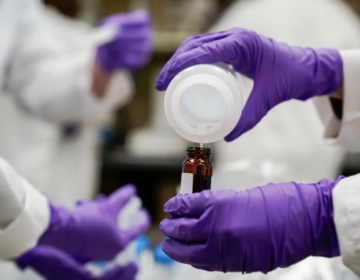Delaware lawmakers tackle toxic PFAS, as Trump administration weakens regulations
The EPA regulated "forever chemicals" last year, but recently proposed to rescind certain restrictions.

File photo: A number of projects are underway to remove PFAS, or 'forever chemicals', from the water in Montgomery County. (marina-tr/BigStock)
This story is part of the WHYY News Climate Desk, bringing you news and solutions for our changing region.
From the Poconos to the Jersey Shore to the mouth of the Delaware Bay, what do you want to know about climate change? What would you like us to cover? Get in touch.
The state of Delaware is aiming to reduce toxic PFAS chemicals in public drinking water as the Trump administration threatens to weaken federal regulations on the so-called “forever chemicals.”
The U.S. Environmental Protection Agency implemented regulations last year requiring water providers to test and treat the “forever chemicals” to almost zero by 2029. But the agency pivoted last month, proposing to rollback certain PFAS restrictions, while extending the compliance deadline to 2031.
Delaware lawmakers say restricting PFAS in drinking water statewide is crucial to ensure that residents’ health is protected. The legislation years in the making passed Delaware’s Senate in May, and awaits a House vote this month.
“This is a serious health issue, so we need to make sure that we’re doing everything we can here in the state of Delaware, regardless of what is done at the federal level,” said state Sen. Darius Brown, the bill’s sponsor.
PFAS, widely used in consumer products such as nonstick cookware and waterproof clothing, as well as in firefighting foam, have been linked to serious health problems, including some cancers, thyroid disease, developmental delays in children and other health conditions.
The health risks associated with PFAS, which can stay in the human bloodstream for years, have sparked numerous lawsuits against chemical manufacturers, such as DuPont and 3M.
Delaware is no stranger to PFAS contamination. Its largest city, Wilmington, is known as the chemical capital of the world and is home to DuPont, which used PFAS chemicals to manufacture its products, such as Teflon. However, PFAS chemicals have been detected across the state, including in the cities of Dover and in Blades, as well as in rivers and streams.
Senate Bill 72, introduced in March, would require Delaware water providers to begin testing for PFAS in January 2026, and reduce PFAS levels in drinking water by 2029. The legislation mirrors the EPA’s regulations adopted last year, restricting two types of PFAS — PFOA and PFOS — to 4 parts per trillion.
The EPA last month pivoted from its Biden-era PFAS regulations, proposing to give water providers another two years to comply. The agency also plans to scrap limits entirely for three other types of PFAS — PFHxS, PFNA and GenX — as well as limitations on a mixture of several types of forever chemicals.
The change comes after water providers sued the EPA last year, arguing that the treatments required to meet the regulations are too costly, and would hit the pockets of ratepayers. While former President Joe Biden set aside billions of dollars to address PFAS, water providers say more resources are needed, and several utilities have sued polluters to help pay for the cost of treatment.
Though PFOA and PFOS are most commonly detected across the U.S., chemicals such as PFHxS are frequently found in communities near airports and military bases, where firefighting foam has been discharged.
Residents who live near the Wilmington Airport in New Castle have exceedingly high levels of PFHxS in their blood from drinking contaminated water, according to the Centers for Disease Control and Prevention. The contamination is associated with the National Guard’s use of firefighting foam on a base at the airport.
Al Fidance is among the New Castle residents with high PFAS levels in their blood, and said he was concerned about the EPA’s proposal to scrap restrictions on certain chemicals.
“The things that you think are in place to protect you, look like a lot of that’s going away,” he said. “It’s going to be a mess. I don’t like it.”
Clean water advocates say the legislation in Delaware, which would restrict PFHxS, PFNA and GenX to 10 parts per trillion, is critical. The state would use funds from a DuPont settlement to help water providers reduce PFAS over the next decade.
“The higher the amount of concentration of PFAS in people’s blood increases their risk for developing a disease that’s linked to these PFAS,” said Tracy Carluccio, deputy director of the Delaware Riverkeeper Network. “It’s more important than ever if the EPA is weakening and backing out [of regulations], the states step up in order to protect the public health of the residents of the state.”

Get daily updates from WHYY News!
WHYY is your source for fact-based, in-depth journalism and information. As a nonprofit organization, we rely on financial support from readers like you. Please give today.






